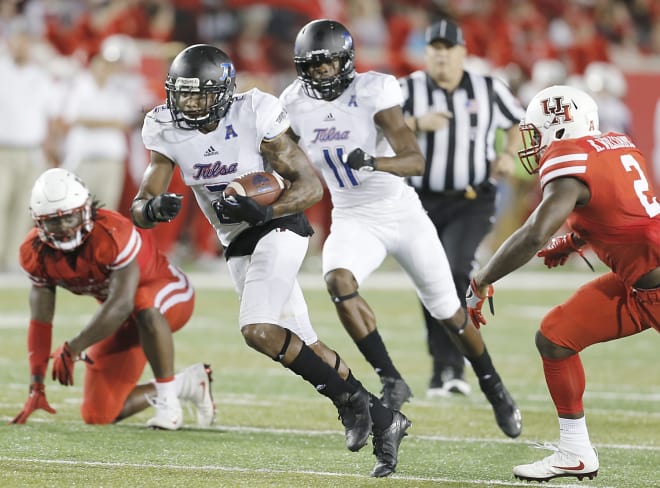Extra Points: Tulsa

Every game is a big game when you’re a championship contender. Two such teams will take the field tomorrow in Annapolis, as the 6-2 Navy Midshipmen face the 7-2 Tulsa Golden Hurricane. The winner will earn a crucial tiebreaker in the race for the West Division of the American Athletic Conference with only two league games left on the schedule.
Navy is entering the contest having won 14 consecutive home games, but it’s going to take considerable effort to push that streak to 15. Tulsa is playing their best football of the season and features one of the most prolific, balanced offenses in the country.
Here are my keys to the game:
Quantity vs. Quality
Tulsa averages 512.1 yards of offense per game, which leads the American Athletic Conference and is ninth in the nation. Their 42.4 points per game are 11th in the nation. These are staggering numbers, but it gets a little more interesting when you dig into the details. Tulsa piles on the yardage, but not in the most efficient manner. They may be ninth in total offense, but they’re only 53rd in yards per play, with 5.92. For comparison’s sake, Navy is 26th with 6.41. Despite having run 237 more plays than Navy this season, they only have seven more plays of 20+ yards. It’s a scheme that relies not on big plays, but in using a fast tempo to ensure that they get as many opportunities as possible.
The interesting thing about Tulsa’s schedule is that their opponents have played right into their hands. ECU, SMU, Houston, Fresno State, Ohio State, and San Jose State are all in the top 40 in total plays run. They all push the tempo. Using that metric, the most leisurely-paced FBS team on their schedule is a tie between Tulane and Memphis. Memphis! Navy will be the first team Tulsa has faced that will keep their offense on the sideline for extended periods.
While the Navy offense doesn’t match Tulsa in sheer output, they are the better unit when it comes to efficiency. That’s why Navy, speaking strictly in terms of scheme, is the Golden Hurricane’s greatest challenge. Tulsa has shown that they are more than capable of winning in a track meet. What they haven’t been forced to do is win a game with limited possessions, something for which the Midshipmen are better suited.
Know thyself
One of Tulsa’s co-defensive coordinators is Brian Norwood, who coached at Navy with Ken Niumatalolo, played at Hawaii with him, and happens to be one of his best friends. He knows how Navy’s offense works, and by that I mean the little things; the timing of quarterback’s cadence, what to expect when you see certain motions, what plays Navy calls in certain situations, etc. That doesn’t mean that Norwood will come up with some grand scheme that finally solves the Navy offense. It could mean, though, that Tulsa’s defenders will be aware of Navy’s tendencies, which will make them a half-step quicker than most teams.
While Ivin Jasper will make adjustments to take advantage of whatever Tulsa does, the danger for Navy is that it might take a drive or two to figure it out. In last year’s game, the Mids had two turnovers and a missed field goal in the first quarter. Tulsa is a better team this year and more likely to take advantage of such a slow start.
The Mids can help themselves by knowing their own tendencies and mixing things up a bit. Maybe run the option without tail motion, for example; while the pitch relationship wouldn’t be ideal, it would allow them to vary the quarterback’s cadence and keep Tulsa from getting a head start on the play.
Penalties
One area where there is a stark contrast between these two teams is in penalties. Navy is the country’s best in avoiding them, and Tulsa among the worst, with the most penalty yards per game in the American. That hasn’t really slowed the Golden Hurricane down; with their warp-speed offense leading to extra possessions per game, no one drive is essential. The fewer possessions you have, though, the greater the impact of each mistake.
Some of Tulsa’s penalty issues are likely the result of their sheer volume of plays; more plays means more chances to do something wrong. However, that can have an effect on the mindset of a team. If players aren’t conditioned to value each possession, then they are more likely to do things that will put a drive in jeopardy. In a game with fewer possessions, that can make all the difference.